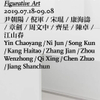分享到微信,
请点击右上角。
再选择[发送朋友]
或[分享到朋友圈]


Reception | Thursday, July 18, 2019, 4 - 6 pm
Exhibition Duration | July 18 – September 8, 2019, 10 am – 6 pm
(Closed on Mondays and public holidays)
PIFO Gallery is now pleased to present you Being Sharp: A Group Exhibition of Figurative Art. The modernity of Chinese art in the 20th century is precisely the reason for figurative art to locate itself in the mainstream of contemporary painting in China. After undergoing the maturing period of naturalism and realism intertwined, the figurative painting originated from traditional painting has been more international and more contemporary at the same time. From a perspective of raising questions, this exhibition brings together a variety of professionally trained artists including Yin Chaoyang, Ni Jun, Song Kun, Kang Haitao, Zhang Jian, Zhou Wenzhong, Qi Xing, Chen Zhuo and Jiang Shanchun. With a shared academic background of these individuals, the exhibition intends to further discuss the possibilities of figurative painting at present.

YIN Chaoyang
Valley, 2019
Oil on canvas
280 × 180 cm
The “figurative art” simply remains a complex concept in the history of Chinese art, although it underwent a distinctive process different from the West. Not aiming to be opposed to “abstract art”, the creation of the concept was intended to distinguish itself from the contemporary art which has no longer focused on representation and figuration, also to distance itself from the socialist realism that is entangled with the legitimacy of a unitary style. In fact, Contemporary painting in China has existed and evolved in such a dilemma from the very beginning. In other words, the majority of artists would not immediately withdraw from their realist art and aesthetic education on one hand; they expect to find out more “international” artistic language and form on the basis of their education on the other hand. Therefore, figurative painting has turned a neutral practical path that respects the local artistic environment and social circumstances.
The “figurative” qualities of contemporary Chinese painting serve as a result of the “naturalism” being gradually separated from the “realism”. Like its Western counterparts, it is another negative and defensive concept applied to organize and deal with the “endgame” of the crises of radicalism. However, it suggests asense of vigilance against the “international trends” and returning to its own artistic tradition over generations. In this regard, the concept itself doesn’t count so much, what really matters is how we handle the shared experience. We might start our discussion about the inevitable experience and history from “being figurative” if a more precisely adequate term cannot be coined for the time being.
This exhibition features artists of diverse styles and approaches. For instance, Yin Chaoyang, Kang Haitao and Zhang Jian connected the external landscape to the emotions and sentiments; they also transformed the realistic landscapes into a spiritual realm by joining and uniting the physical experiences in the process of painting. Based on his experience in the history of painting, NiJun incorporated his interest in en plein air in the 19th century into the real-life subject matters and spirituality. Song Kun and Chen Zhuo professionally applied the realist style and techniques to the symbolic figures and the relations between figures and images, leading to a transcendental spirituality. Zhou Wenzhong constructed an unrealistic space using identifiable figuration, turning the images into a field of performance and theatre. Qi Xing and Jiang Shanchun depicted the realistic situations in an exquisitely detailed manner, enabling the viewers to observe every unnatural detail thanks to their mastery of an extremely naturalistic vision and methodology. Even though their work and practice do not intend to become a trend or a role model, all of them suggest a sense of open-mindedness and recognition of both individual and collective experiences. This may be the very way of manifesting a true sense of contemporariness for the time being.

NI Jun
Five Blue Abalones, 2019
Oil on canvas
60 × 80 cm

SONG Kun
Six messengers of Ksitgarbha - Devakany of Treasure, 2015
Oil on canvas crystal resin collage, LED, eyes of a toy
220 × 140 cm

KANG Haitao
Hidden Confluence, 2017-2018
Acrylic, ink on paperboard
175 x 252 cm

ZHANG Jian
Houhai Series, 2011
Oil on canvas
250 × 200 cm

ZHOU Wenzhong
The Unbidden Guest, 2017
Oil on canvas
180 x 210 cm

QI Xing
All His Life, 2009-2014
Oil on canvas
150 × 180 cm

CHEN Zhuo
Moon Melancholia, 2017
Oil on canvas
80 × 140 cm

JIANG Shanchun
Yue, 2019
Oil on canvas
D 60 cm
-----------------------------------------------
Yin Chaoyang (b.1970)
Ni Jun (b.1963)
Song Kun (b.1977)
Kang Haitao (b.1976)
Zhang Jian (b.1968)
Zhou Wenzhong (b.1974)
Qi Xing (b.1982)
Chen Zhuo (b.1986)
Jiang Shanchun (b.1979)
(The article is written by Bao Dong, an independent curator.)
关于画廊
偏锋新艺术空间成立于2006年,坚持对中国当代艺术进程的洞察以及对欧洲及战后艺术大师的探索,并在两者的对话与碰撞中寻找各种可能的艺术力量;也是中国最早推动抽象艺术研究与发展的主要画廊。偏锋深信艺术的体验产生于一个又一个的变革中创造的新世界;艺术家的作品正是探索世界的第三只眼睛。对于收藏家,我们为其提供专业知识,鼓励他们发掘个人独特的视角,只因两者的充分结合才能构建卓越的收藏。我们希望更多的藏家可以秉持鉴赏家的心态,更深入地理解当代艺术以及欣赏画廊发掘、重塑并坚信的艺术家。
About the Gallery
PIFO Gallery was founded in 2006 as a major gallery in China specialized in the study and promotion of abstract art. PIFO Gallery concentrates on the participation of the course of Chinese contemporary art and the exploration of post-war European master artists and seeking for all possibilities of art power in the dialogue and collision between the two aspects. We hope to see a growing number of collectors to take on the roles of a connoisseur, with a more in-depth understanding of Asian and Western contemporary art, and appreciate the artists discovered, reshaped and firmly believed in by the gallery.
媒体/图片垂询 Press enquiries/images
邵俊芳 Junfang Shao shaojunfang@pifo.cn
T: +86 10 59789562-8005
其他垂询 All other enquiries
王彧涵 Sophia Wang sophia.wang@pifo.cn
M: +86 18210011135

作者:偏锋新艺术空间

分享到微信,
请点击右上角。
再选择[发送朋友]
或[分享到朋友圈]

